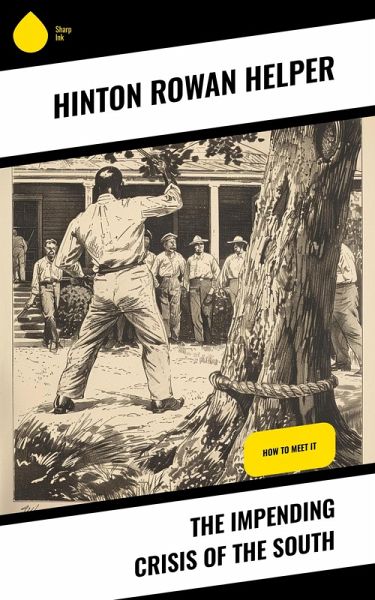
The Impending Crisis of the South (eBook, ePUB)
How to Meet It

PAYBACK Punkte
0 °P sammeln!
In "The Impending Crisis of the South," Hinton Rowan Helper presents a compelling and provocative analysis of the socioeconomic conditions in the antebellum South, arguing that the institution of slavery hindered the region's economic progress and created a host of societal issues. Written in a scholarly yet accessible style, Helper's work is deeply rooted in statistical evidence and contemporary political discourse, making it a crucial contribution to the abolitionist literature of its time. The book not only critiques the moral implications of slavery but also emphasizes the economic consequ...
In "The Impending Crisis of the South," Hinton Rowan Helper presents a compelling and provocative analysis of the socioeconomic conditions in the antebellum South, arguing that the institution of slavery hindered the region's economic progress and created a host of societal issues. Written in a scholarly yet accessible style, Helper's work is deeply rooted in statistical evidence and contemporary political discourse, making it a crucial contribution to the abolitionist literature of its time. The book not only critiques the moral implications of slavery but also emphasizes the economic consequences of a society built on such an oppressive system, offering a rare glimpse into the complexities of Southern life in the mid-19th century. Hinton Rowan Helper, born in 1820 in North Carolina, was a fierce advocate for economic progress and social justice, instincts shaped by his upbringing in a slaveholding state. His own experiences witnessing the disparities and injustices of the Southern society motivated him to take a controversial stand against slavery, transcending the boundaries of regional loyalty. Helper's position as a Southern white man writing against slavery was both a radical and dangerous endeavor, placing him at odds with many of his contemporaries in the South. This book is recommended to anyone interested in understanding the multifaceted effects of slavery on Southern society and the arguments against it from a unique Southern perspective. "The Impending Crisis of the South" is not only a significant historical document but also a thought-provoking read for those examining the intersections of economics, morality, and human rights during a pivotal time in American history.
Dieser Download kann aus rechtlichen Gründen nur mit Rechnungsadresse in A, B, BG, CY, CZ, D, DK, EW, E, FIN, F, GR, HR, H, IRL, I, LT, L, LR, M, NL, PL, P, R, S, SLO, SK ausgeliefert werden.













